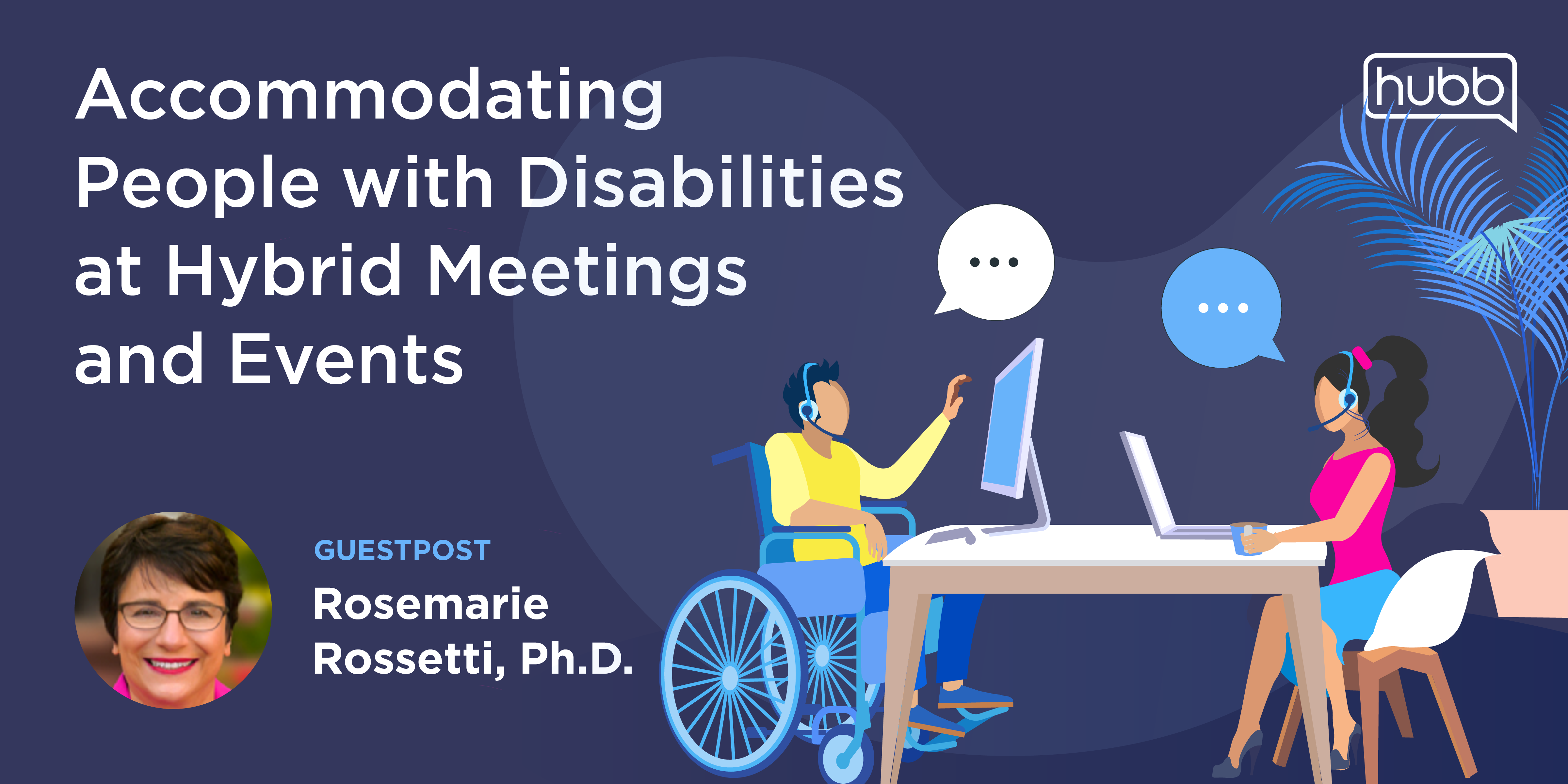Hybrid meetings have become more popular in recent months due to the pandemic. They may be here to stay in the future due to the safety precautions implemented to contain the spread of COVID-19.
Meeting professionals have seen attendance increase for virtual meetings because attendees prefer to stay in their homes safe from harm. People with disabilities especially benefit from having the ability to attend virtual meetings at home rather than putting in the extra effort to attend in-person meetings. People with visual impairments, blindness, deafness, or hearing impairments may need special accommodations.
On September 8, 2020, I spoke on the topic, Accommodating People with Disabilities at Meetings and Events, at the MPI North Florida Chapter hybrid meeting and on November 4, 2020, at the MPI Pittsburgh Chapter hybrid meeting.
I worked with meeting professionals in advance to make accommodations. They hired a sign language interpreter who stood next to me while I spoke. The video camera was focused on both of us so the virtual audience could see us.
The meeting professionals also arranged for closed captioning through Wordly www.Wordly.ai. This is a software application using artificial intelligence that provides an instant translation of what a speaker is saying to each member of the audience. The text or audio appears on the audience members’ smartphones, laptops, and tablets. The audience can choose from eighteen languages for the translation.
Closed captioning is a benefit for all the participants, not only for those who are deaf or hearing impaired. Most people are visual learners. When they can read the captions they are better able to understand and remember. They can later receive a transcript of the meeting. This transcript is a great resource for the future and reduces the need for the attendees to take notes.
When the MPI meetings began, a moderator welcomed the virtual audience. There were greeters at the registration table for the in-person audience. Face masks were worn and social distancing was the rule.
To make hybrid events run more smoothly be mindful of the needs of people with a hearing disability. This is especially relevant for networking functions and registration at the event. Hearing-impaired people may need to read lips. It is difficult to read someone’s lips if a face mask conceals their lips. Face masks can be purchased with a clear view area so that a hearing-impaired person can see other people’s lips moving, thus enhancing the communication process.
It is also a good practice to ask the person with a hearing disability where they would like to sit. Accommodate their request so they are seated in front of the unmasked person speaking at the meeting. For a virtual meeting, make sure the person who is speaking can be seen so that their lips can be read by the attendee.
At the MPI meetings, a video camera was positioned on me and the sign language interpreter. My slides were sent in advance so they could be loaded on the main computer and shown to both audiences. I used a remote control to advance the slides.
If there had been people in my two audiences who were blind or vision impaired, I would have added a few more sentences to narrate each slide to describe what was on the screen. This would have been important since they would not be able to see the visuals. If requested by any attendee, I suggest that the speaker send a copy of their slides in advance of the meeting. When handouts are a part of the meeting, ask those with visual disabilities in what format they would like them prepared and send them in advance of the meeting. A format example includes an 18 point font in the original Word document.
Here are additional tips to help meeting professionals plan inclusive hybrid meetings and events.
- When people register, there should be a question for them to answer to indicate their need for special accommodations due to a disability.
- Ask for any special accommodations to be communicated at least two weeks in advance of the meeting.
- Those needing special accommodations should be contacted by phone and/or email to find out their requests.
- The vendors that provide these accommodations should be identified to assist with their request.
It is important to communicate and not assume what services or special accommodations people with disabilities need. Accommodating people with disabilities is about taking care of people and treating them with dignity and respect so they can participate equally and feel fully included. Listen to their requests and ask them for suggestions on what can be done to best accommodate their needs. Communicate with others on the planning team to inform them of changes that need to be made for these accommodations.
Meeting professionals must lead with an inclusive mindset. They should be informed and show an ability to understand and share the feelings of another.
AUTHOR:
 Rosemarie Rossetti, Ph.D, President at Rossetti Enterprises Inc.
Rosemarie Rossetti, Ph.D, President at Rossetti Enterprises Inc.
“Rosemarie Rossetti, Ph.D. is a powerful, internationally known speaker, trainer, author, consultant, and president of Rossetti Enterprises Inc. She speaks to and consults with meeting professionals to help them save time, reduce stress, and achieve success in planning more diverse and inclusive meetings and events.” www.RosemarieSpeaks.com


